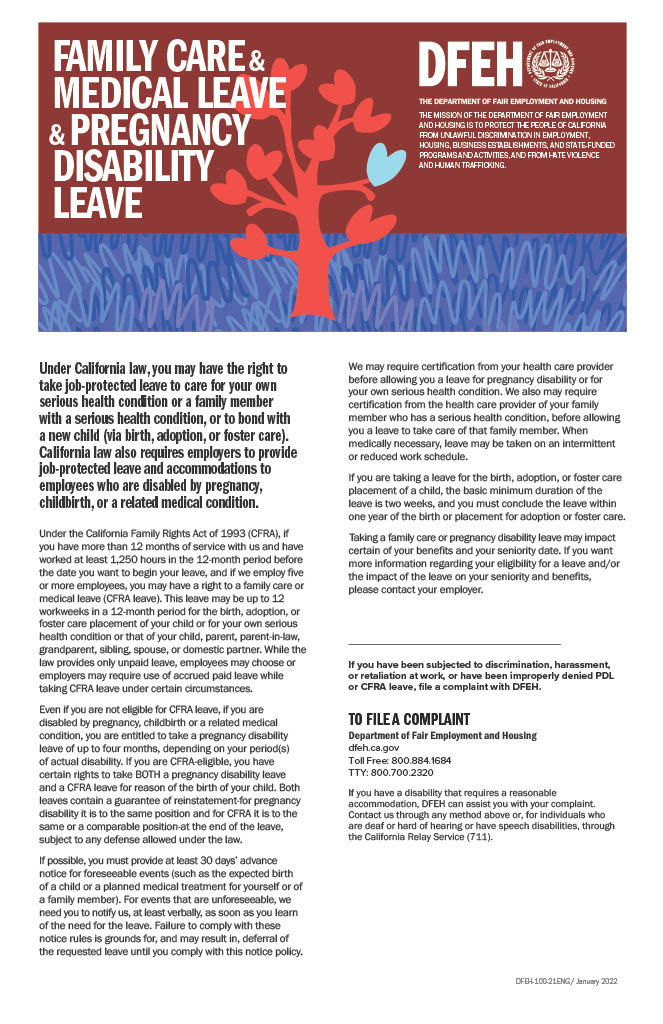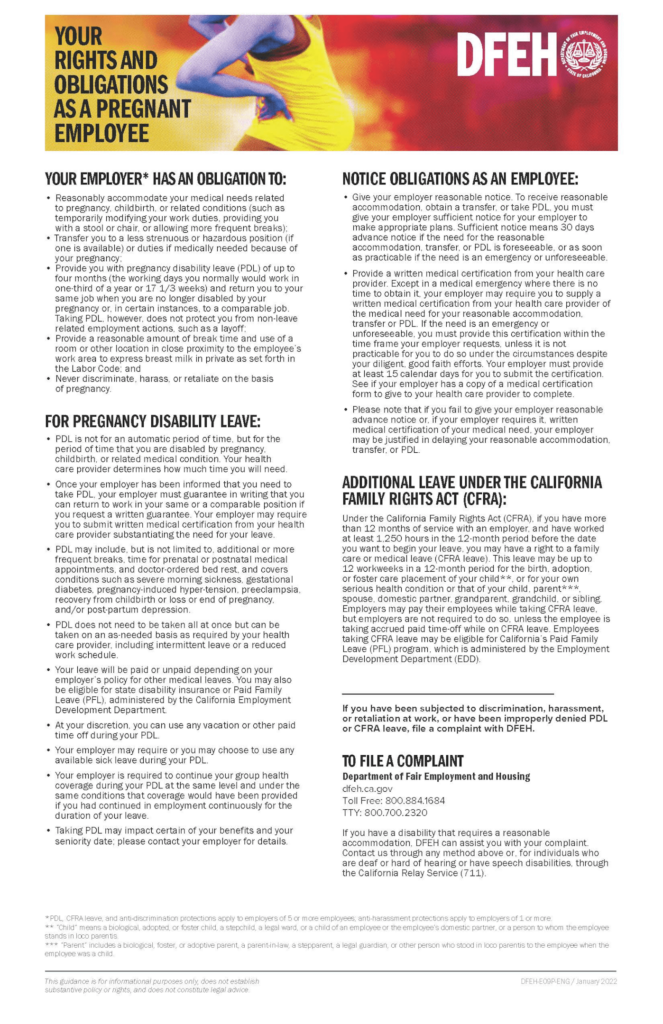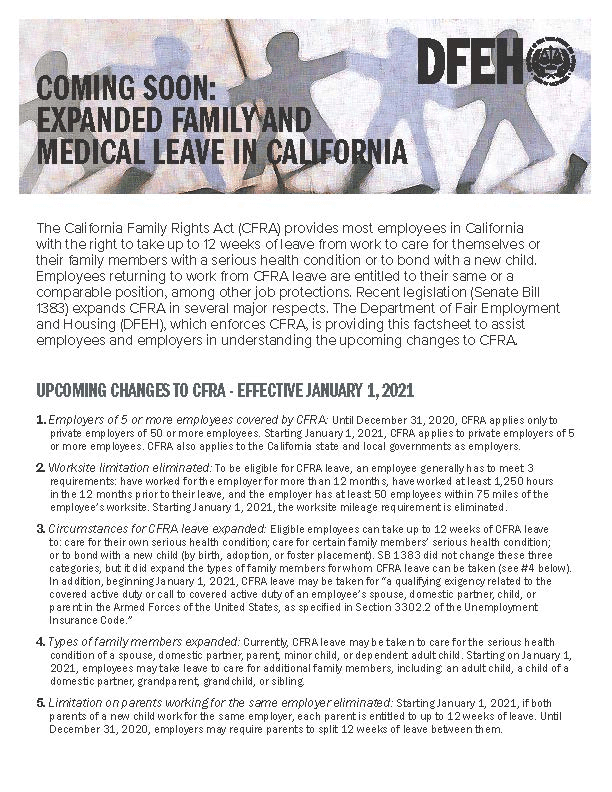
The California Family Rights Act ("CFRA") authorizes eligible employees to take up a total of 12 weeks of unpaid job-protected leave during a 12-month period. While on leave, employees keep the same employer-paid health benefits they had while working. In addition, covered California employers are required to provide employees disabled by pregnancy, childbirth, or a related medical condition with unpaid, job-protected leave and/or reasonable accommodations.
While CFRA leave is normally unpaid, some employers offer pay as part of CFRA California leave.

Under Pregnancy Disability Leave ("PDL"), California law also guarantees job-protected leave to eligible employees who are disabled by pregnancy, childbirth, or a related medical condition. PDL leave is separate from and in addition to CFRA leave for eligible employees or pregnant employees to bond with a new child (via birth, adoption, or foster care placement). Employees also may have federal rights to leave for a pregnancy-related disability or to bond with a new child, which are provided for by Family and Medical Leave Act ("FMLA"), which for many California employee run concurrent to CFRA benefits. When both state and federal laws apply, the employee receives the benefit of the more protective law.

Employment Eligibility for Leave
CFRA: You have or a family member has a serious health condition, you have worked for covered employers for over one year, you have over 1250 hours of service in the past year, and your employer has five or more employees.
PDL: You have a pregnancy-related disability and your employer has five or more employees.
FMLA: You have or a family member has a serious health condition, you have worked for your employer for over one year, you have over 1250 hours of service in the past year, and 50 or more employees work within 75 mile radius.
Serious Health Condition Defined
CFRA: A serious health condition is an illness, injury, or physical or mental condition that involves either inpatient care or continuing treatment by a healthcare provider.
PDL: See below.
FMLA: A serious health condition is an illness, injury, or physical or mental condition that involves either inpatient care or continuing treatment by a healthcare provider.
Pregnancy as a “Serious Health Condition”
CFRA: Pregnancy itself is not covered as a serious health condition. Instead, in California, a pregnant employee is entitled to PDL of up to 4 months. The eligible CFRA employee can then take a twelve week CFRA baby bonding leave. The first 12 weeks of PDL can run concurrently with FMLA for eligible employees, and for that period, employers need to keep eligible employees health benefits.
PDL: Covered as a serious health condition if you have a pregnancy-related disability.
FMLA: Covered as a serious health condition under the Family and Medical Leave Act.
Registered Domestic Partners Equal to Spouse
CFRA: Covered under CFRA, registered domestic partners are covered just like spouses. Note that this may give a domestic partner more family leave.
PDL: Only applies to the individual employee and not an employee's spouse or registered domestic partner.
FMLA: Not covered and not entitled to protective leave to care for a registered domestic partner.
“Qualifying Exigency” because of employee’s or family member’s active military duty
CFRA: Not covered under CFRA.
PDL: Not applicable under PDL.
FMLA: Eligible FMLA employees are entitled to up to 12 weeks (3 months) of leave for “any qualifying exigency” arising because the employee has a family member (spouse, child, parent) who is on active military duty or who has been notified of an impending call to active duty status, in support of a contingency operation. Health benefits are included. The family members must be a member of the Guard, Reserve or be a retired member of the Armed Services.
Care for Ill or Injured Service Member
CFRA: Covered under CFRA if family member is a spouse, child, or parent.
PDL: Not applicable under PDL.
FMLA: Covered. An employee who is the spouse, child, parent, or next of kin of a covered service member may take a total of 26 weeks (6.5 months) of leave during a 12-month period to care for a covered service member who is ill or injured in the line of duty on active duty. Health benefits are included.
Is my partner/the child’s other parent entitled to Leave for Pregnancy Disability and Child Bonding?
CFRA: Yes. Both parents (including fathers, adoptive/foster parents, or same sex parents) are entitled to CFRA leave, even if both parents work for the same employer.
PDL: No. PDL only applies to the parent who has a disability related to the pregnancy.
FMLA: Yes.

Disability Insurance (DI) and Paid Family Leave (PFL) provide wage replacement benefits only; they do not provide job protection. DI and PFL do not change the federal or state leave laws in any way and are completely separate from them. Your job may be protected under other employee leave laws, such as the FMLA or the CFRA, but these are unpaid leaves.
DI provides up to 52 weeks of paid benefits when you are unable to work and have a wage loss due to your own non-work-related illness, injury, pregnancy, or childbirth.
PFL provides up to eight weeks of paid benefits when you have a wage loss due to taking time off work to:
No. Disability Insurance and Paid Family Leave provide wage replacement benefits only - they do not provide job protection. Your job may be protected under other employee leave laws, such as the FMLA or CFRA.
Yes. If your company is covered by the terms of FMLA and CFRA, your employer may require you to take FMLA and CFRA leave while you are receiving Disability Insurance or Paid Family Leave benefits if you have health conditions or a mental condition that is a qualifying reason or are a new parent to qualify for family medical leave.
For current and former California employees, if your employer is violating federal leave laws, California Federal Rights Act, California's Pregnancy Disability Leave Law, or Family and Medical Leave Act, contact the attorneys at Freeburg & Granieri, APC to discuss how we can help you protect yourself.
California employers should review the new regulations and consult with experienced counsel regarding the changes. Employers also should review and revise their CFRA policies, posters, handbooks, and forms as may be necessary to conform to the amended regulations. In addition, employers should train their human resources personnel or managers responsible for administering CFRA leave requests and leave about these changes to the California requirements.
Please contact the attorneys at Freeburg & Granieri, APC if you have any questions about the amended regulations, and to discuss your specific organizational needs and how to comply.
Our clients become friends, confidants, and repeat customers. Former clients are our best referral source.
Do not be a commodity, find an attorney who treats your legal issue with the care it deserves.

